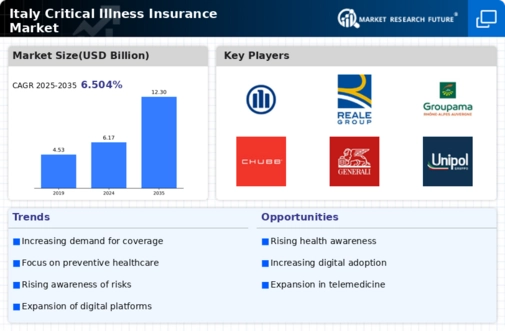The critical illness-insurance market in Italy is characterized by a competitive landscape that is increasingly shaped by innovation, digital transformation, and strategic partnerships. Key players such as Prudential (GB), Allianz (DE), and Cigna (US) are actively pursuing strategies that enhance their market positioning. Prudential (GB) focuses on leveraging technology to streamline customer engagement and claims processing, while Allianz (DE) emphasizes sustainability in its product offerings, aligning with growing consumer demand for responsible insurance solutions. Cigna (US) is enhancing its service delivery through strategic partnerships with healthcare providers, thereby improving access to critical illness coverage. Collectively, these strategies contribute to a dynamic competitive environment where adaptability and customer-centric approaches are paramount.
In terms of business tactics, companies are increasingly localizing their operations to better meet regional needs, which appears to be a response to the diverse healthcare landscape in Italy. The market structure is moderately fragmented, with several players vying for market share, yet the influence of major companies remains substantial. This competitive structure allows for a variety of product offerings, catering to different consumer segments and preferences.
In October 2025, Prudential (GB) announced a partnership with a leading telehealth provider to enhance its critical illness insurance offerings. This strategic move is likely to improve customer access to healthcare services, thereby increasing the perceived value of their insurance products. By integrating telehealth solutions, Prudential (GB) not only addresses the immediate healthcare needs of policyholders but also positions itself as a forward-thinking player in the market.
In September 2025, Allianz (DE) launched a new line of eco-friendly critical illness insurance products, which is indicative of a broader trend towards sustainability in the insurance sector. This initiative not only caters to environmentally conscious consumers but also aligns with regulatory trends favoring sustainable business practices. The introduction of these products may enhance Allianz's brand reputation and attract a new customer base that prioritizes sustainability.
In August 2025, Cigna (US) expanded its critical illness insurance coverage to include mental health conditions, reflecting a growing recognition of the importance of mental health in overall well-being. This strategic expansion is significant as it addresses a critical gap in traditional insurance offerings, potentially attracting a wider audience and enhancing customer loyalty. By broadening its coverage, Cigna (US) demonstrates its commitment to holistic health solutions, which may resonate well with consumers seeking comprehensive protection.
As of November 2025, the competitive trends in the critical illness-insurance market are increasingly defined by digitalization, sustainability, and the integration of artificial intelligence (AI) in service delivery. Strategic alliances are becoming more prevalent, as companies recognize the value of collaboration in enhancing service offerings and operational efficiency. Looking ahead, competitive differentiation is likely to evolve from traditional price-based competition towards a focus on innovation, technology integration, and supply chain reliability. This shift suggests that companies that prioritize these areas will be better positioned to thrive in an increasingly complex market.



















Leave a Comment